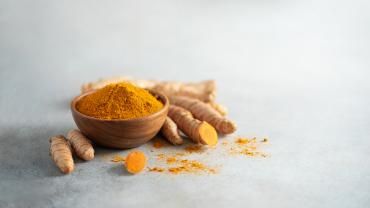
There are only a few natural products that have demonstrated an extensive range of protective properties such as curcumin, which is derived from the turmeric root. Turmeric has three main bioactive components: curcumin, desmethoxycurcumin, and bisdemethoxycurcumin. These curcuminoids have many biological effects, including properties that are anti-inflammatory, antioxidant, anti-tumor, antimicrobial, and antiviral.
A recent systematic review of the current scientific literature was published in the journal of Critical Reviews in Food Science and Nutrition. This review investigated the evidence for the effects of curcumin supplementation for humans on sports performance and physical exercise. Until recently, only animal models demonstrated the beneficial effects of curcumin supplementation on reducing inflammation and oxidative stress, preventing muscle damage and fatigue, and supporting muscle recovery.
After assessing risk of bias and eligibility criteria, 11 randomized and crossover clinical trials were included in this review. The sample size varied from 8 to 47 study participants, and the intervention time varied from 1 day to 3 months using anywhere between 0.01 g and 6 g of curcumin per day. Exercise types varied from resistance training to aerobics.
Curcumin possesses the ability to inhibit transcription factors (e.g., nuclear factor [NF]-κβ) that are responsible for activating pro-inflammatory enzyme and cytokine expression, such as cyclooxygenase (COX)-2, 5-lipoxygenase (LOX-5), tumor necrosis factor (TNF)-α, interleukin (IL)-1, IL-6, and IL-8, suggesting their importance in helping to reduce post-exercise inflammation. In this review, it was found that the ability of curcumin to modulate NF-κβ — a regulator of myogenesis and an important factor in the inflammatory cascade — may support myoblast proliferation and differentiation, allowing for increases in muscle strength and repair.
The treatment groups with doses ranging from 180 mg to 5 g of curcumin per day showed significant reductions in inflammation caused by physical exercise compared to the placebo group, whose participants displayed elevated IL receptor agonist activity of IL-6, IL-8, and IL-10, and TNF-α concentrations. Furthermore, 180 mg of curcumin per day for 4 days significantly reduced muscle pain and improved the range of motion 3 to 4 days after resistance exercise compared to a placebo.
Supplementation for 3 months with 10 mg of curcumin per day plus 105 mg of Boswellia serrata per day significantly reduced malondialdehyde and endogenous advanced glycation end products (both markers of oxidative stress) compared to controls. Compared to a placebo after aerobic exercise, 90 mg and 180 mg of curcumin supplementation per day resulted in decreased serum reactive oxygen metabolite derivatives and showed higher values of reduced glutathione and biological antioxidant potential, demonstrating the effects of this phytonutrient on oxidative stress. Compared to the treatment group, a gastrointestinal (GI) barrier damage marker (fatty acid−binding protein) was elevated after aerobic exercise in the placebo group, suggesting curcumin may improve GI function during exercise-induced exertional heat stress.
Overall, the results of this systematic review showed positive effects with no adverse symptoms or injuries reported. Curcumin supplementation improved exercise-induced muscle recovery, muscle performance, psychological and physiological parameters, function, and reduced inflammation, oxidative stress, pain, and muscle damage caused by aerobic and resistance training. Although larger clinical trials are needed, the evidence suggests that curcumin supplementation may be a safe and effective option for supporting sports and exercise performance in humans.
By Caitlin Higgins, MS, LDN, CNS